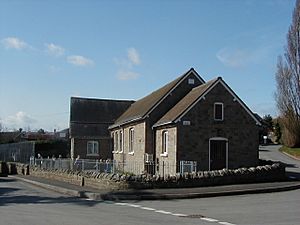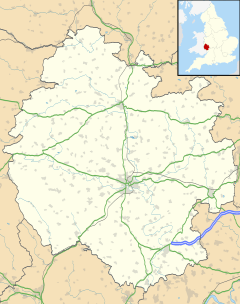Whitbourne, Herefordshire facts for kids
Quick facts for kids Whitbourne |
|
|---|---|
 Whitbourne C of E Independent School & Hub - WISH |
|
| Population | 799 (2011) |
| OS grid reference | SO723567 |
| • London | 146m |
| Civil parish |
|
| Unitary authority | |
| Ceremonial county | |
| Region | |
| Country | England |
| Sovereign state | United Kingdom |
| Post town | Worcester |
| Postcode district | WR6 |
| Dialling code | 01886 |
| Police | West Mercia |
| Fire | Hereford and Worcester |
| Ambulance | West Midlands |
| EU Parliament | West Midlands |
| UK Parliament |
|
Whitbourne is a small village in Herefordshire, England. It's located near the River Teme and the A44 road. The name "Whitbourne" comes from an old language called Anglo-Saxon, and it means "white stream." It's a peaceful place, close to Bringsty Common and the border of Worcestershire.
Around 400 people live in the village itself. About the same number live in the surrounding houses and farms. Whitbourne has a special pumping station run by Welsh Water. This station helps supply water to the nearby town of Bromyard and the areas around it.
Contents
What is Whitbourne Like?
Whitbourne is a quiet village in eastern Herefordshire. It sits right by the River Teme. The village is also very close to the A44, a main road. On one side, you'll find Bringsty Common, which is a large open space. On the other side, the village is near the border with Worcestershire.
The village has a water pumping station. This station is important because it provides water to Bromyard. In July 2007, the pumping station experienced a flood.
Schools and Learning
Whitbourne used to have a Church of England Primary School. It was located right in the middle of the village. The number of students at the school changed over time, usually between 40 and 70 children.
Sadly, the school closed in July 2013 because fewer students were attending. However, a local group quickly decided to reopen the building. With permission from the church, they started a new free school called WISH in September 2013. This new school also closed after a short time.
Community Life
Today, Whitbourne has one pub, which is called The Live at Whitbourne. It's a place where people can meet and relax.
The village also has a special shop. This shop is run completely by volunteers. It's located in a new building south of where the old school was. Since 2021, the shop has a system to recycle or compost any fruit and vegetables that don't get sold. This helps the environment.
The shop stayed open every single day during the Covid-19 pandemic in 2020-2021. This was a huge help to everyone in the community. Because the shop doesn't aim to make a profit, any money it earns goes back into helping the community.
Historic Buildings
Whitbourne is home to some interesting old buildings. These buildings tell stories about the village's past. They are important parts of the local history.
Whitbourne Hall: A Grand House
Whitbourne Hall is a very impressive building located just outside the village. It is a grade II* listed building. This means it is a very important historic building. It was built in a style called neo-Palladian, which is a type of grand, classical design.
Today, Whitbourne Hall is divided into private homes. However, parts of the hall can be rented for special events. People can hold private parties, business meetings, or even take group tours there.
Whitbourne Court and a Moon Story
Whitbourne Court is another historic building, located near the church. This building was once the summer home of the Bishop of Herefordshire. One famous bishop who lived there was Francis Godwin.
Francis Godwin wrote a story called The Man in the Moone. This book was published in 1638, after he had passed away. Some people think this story is one of the very first science fiction stories ever written! It's amazing to think that a story about traveling to the moon might have come from Whitbourne.
 | Sharif Bey |
 | Hale Woodruff |
 | Richmond Barthé |
 | Purvis Young |


